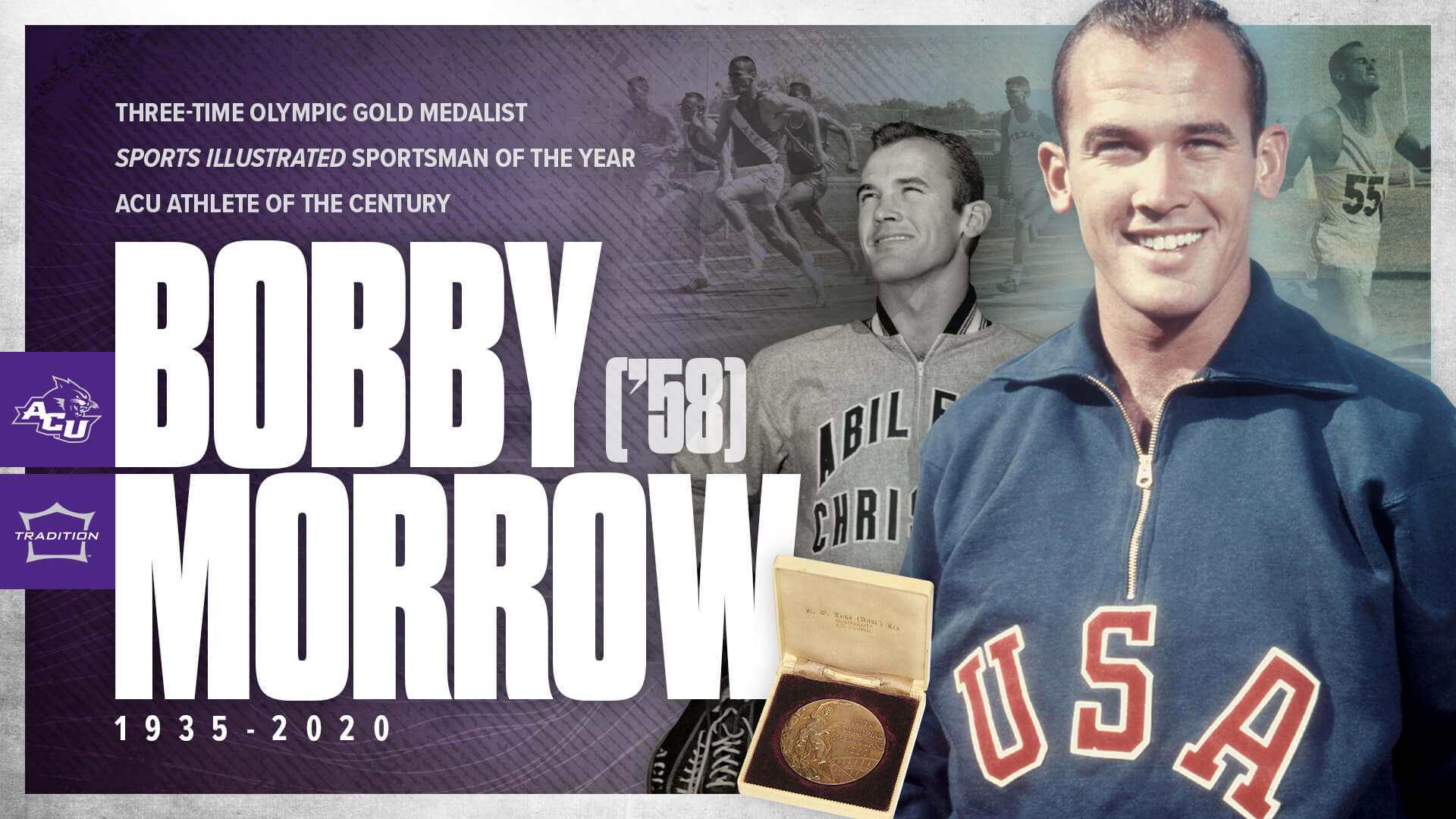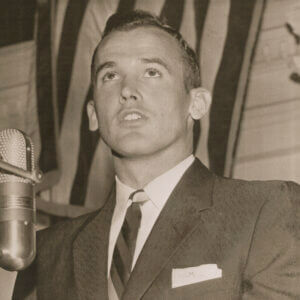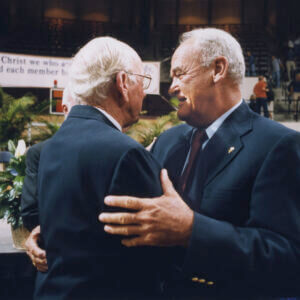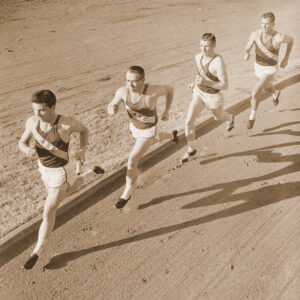
Bobby Joe Morrow, whose exploits in track and field as a student at Abilene Christian University made history and put his alma mater on the world map, died May 30, 2020, at age 84 at his home in San Benito, Texas.
A memorial service will be held at 11 a.m. Wednesday, June 3, at Buck Ashcraft Funeral Home in Harlingen, Texas (710 Ed Carey Drive, 78550), followed by burial at Restlawn Memorial Park in La Feria, Texas.
Morrow was born Oct. 10, 1935, in Rangerville, Texas, near San Benito, where his family owned and operated a 600-acre cotton and carrot farm. He graduated in 1954 from San Benito High School, where he was a three-time state champion sprinter. He earned a B.S. degree in physical education from Abilene Christian in 1958.

A three-time champion at the 1956 Olympic Games, Morrow was often called “the greatest sprinter of all time” and “the world’s fastest human.” At age 21 as an ACU junior, he became the first person since Jesse Owens in 1936 to win three Olympic gold medals in track and field when he won the 100 meters and 200 meters, and anchored the winning 400-meter relay team for the U.S. in Melbourne, Australia.
“There is no way to measure the unprecedented visibility and goodwill that has come to our university because of what he accomplished as a student-athlete,” said ACU president Dr. Phil Schubert (’91). “We stand on the shoulders of Bobby Morrow and his world-record-setting teammates and coaches, and on what they did to make Abilene Christian known around the globe.”
Sports Illustrated magazine named Morrow Sportsman of the Year for 1956, from among finalists including New York Yankees standouts Mickey Mantle and Don Larsen, NFL MVP Frank Gifford of the New York Giants, heavyweight boxing champion Floyd Patterson, and University of Notre Dame All-America running back Paul Hornung, winner of the Heisman Trophy.
Morrow appeared on the front covers of Life, Sport, Track and Field News and other magazines and won the James E. Sullivan Memorial Trophy from the AAU in 1957 as the outstanding amateur athlete in the U.S. He also was named Athlete of the Year by Sport magazine and by the Knute Rockne Foundation.
He won 14 titles in 100- and 200-meter races while competing for the Wildcats at NCAA Division I, NAIA and U.S. national championships. In individual sprints and as a member of Abilene Christian and U.S. relay teams, Morrow is officially credited by the IAAF with a total of 16 world records. His world records included 10.2 in the 100 meters and 20.6 in the 200 meters, with a career best of wind-aided 9.1 in the 100-yard dash.
“He’s the caliber of athlete who comes along only once in a lifetime or once in a century. He set the standard for others,” said Garner Roberts (’70), former longtime ACU sports information director who researched and wrote widely about the Wildcat sprinter. “Obviously, he had God-given ability, but he had tremendous desire to win and was dedicated to training and committed to hard work. He had the best sprint and relay coaching in America from Oliver Jackson. He was humble and shared the glory with his coaches and teammates. It’s been said he put ACC on the map. But he also put Abilene, Texas, on the map. I’m thankful my dad took me as a boy to see him run. And I’m proud to have known Bobby and coach Jackson.”

Morrow finished his four-year career at Abilene Christian with a record of 80-8 in individual sprint races for legendary coach Oliver Jackson (’42).
“When I was a kid growing up in Rule, Texas, everyone who loved track and field knew of the legendary Bobby Morrow,” said Wes Kittley (’81), who was a middle distance runner at Abilene Christian and later coached teams at his alma mater to 29 NCAA Division II national championships from 1985-99. He just completed his 21st season as head track and field and cross country coach at Texas Tech University. The Red Raiders’ men’s team won its first Division I national title in 2019.
“I have always felt my success at ACU, and me attending school there as a student-athlete, was in part because Bobby had been a Wildcat. I wanted to be a part of the program he had built,” Kittley said. “I will always be thankful for what he did for ACU and the world of track and field.”
In 1959, Morrow was named one of nine “Greatest Living Americans” by the U.S. Chamber of Commerce. He is a member of the ACU Sports Hall of Fame, Texas Sports Hall of Fame, U.S. Track and Field Hall of Fame, and U.S. Olympic Hall of Fame.
Morrow donated his gold medals to the Smithsonian Institution in Washington, D.C., the Texas Sports Hall of Fame and ACU.

His accomplishments created opportunities for travel and speaking engagements around the nation. Morrow addressed a joint session of the Texas Senate and House of Representatives, and appeared on national TV broadcasts of “The Ed Sullivan Show” and “What’s My Line?”
He was credited with Wildcat track and field being named “Texas Sports Dynasty of the Century” by Texas Monthly magazine in 1999. In 2005, Morrow was named ACU’s Athlete of the Century. The high school gymnasium and football stadium in San Benito are named after him.
“I found my way to ACU because of Bobby,” said quartermiler Earl Young (’62), who followed Morrow as an Olympic gold medal winner for the U.S. in Rome in 1960.
“I was in 10th grade and my first year of high school track in San Fernando, California, when I saw him in the 1956 Olympics,” Young recalled. “I immediately began to create my interpretation of his relaxed running style. Little did I know that three years later, he and coach Jackson would pop into my dad’s office while they were in California for the Colosseum Relays and ask to meet me. There I was at age 17, shaking the hand of my hero. Bobby Morrow brought Abilene Christian to the attention of the world and I am just one of the Wildcats who benefited from his accomplishments.”
He was preceded in death by his parents, B. Floyd and Mattie Morrow.
Follow acu.today for more about Morrow’s legacy.
Related Morrow coverage
- Time, Life, SI: Wildcats have covered them all
- Olympic Diary: ACU’s ‘Texas Sports Dynasty’
- Olympic Diary: Politics, sport often mix
- Olympic Diary: The wide world of ACU sports
- Saturday’s meet the biggest at ACU in 55 years
- ACU Remembers: Bill Woodhouse
- ACU Remembers: Waymond Griggs
— Ron Hadfield
July 6, 2020
